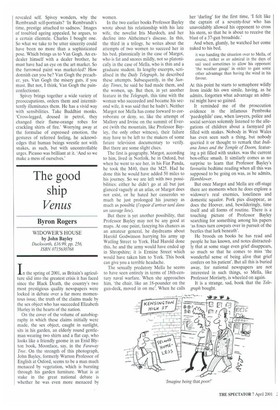The good ship Venus
Byron Rogers
WIDOWER'S HOUSE by John Bayley Duckworth, £16.99, pp. 256, ISBN 0715630768 In the spring of 2001, as Britain's agriculture slid into the greatest crisis it has faced since the Black Death, the country's two most prestigious quality newspapers were locked in debate over a far more momentous issue, the truth of the claims made by the sex object who has succeeded Elizabeth Hurley in the hearts of the nation.
On the cover of the volume of autobiography in which these claims initially were made, the sex object, caught in sunlight, sits in his garden, an elderly round gentleman wearing two shirts and a flat cap, who looks like a friendly gnome in an Enid Blyton book, Moonface, say, in the Faraway Tree. On the strength of this photograph, John Bayley, formerly Warton Professor of English at Oxford, seems to be a man much menaced by vegetation, which is bursting through his garden furniture. What is at stake in the great national debate is whether he was even more menaced by
women.
In the two earlier books Professor Bayley wrote about his relationship with his late wife, the novelist Iris Murdoch, and her decline into Alzheimer's disease. In this, the third in a trilogy, he writes about the attempts of two women to succeed her in his bed, platonically in the case of Margot, who is fat and snores mildly, not so platonically in the case of Melia, who is thin and a graduate student. In lengthy excerpts, serialised in the Daily Telegraph, he described these attempts. Subsequently, in the Sunday Times, he said he had made them, and the women, up. But then, in yet another feature in the Telegraph, this time with the woman who succeeded and became his second wife, it was said that he hadn't. Neither Margot nor Mella has come forward to corroborate or deny, so, like the attempt of Mallory and Irvine on the summit of Everest (with the mountain, like Professor Bayley, the only other witness), their failure may have to be left to the makers of some future television documentary to verify. But there are some slight clues.
The first is geography. Margot, according to him, lived in Norfolk, he in Oxford, but when he went to see her, in his Fiat Panda, he took the MQ, then the M25. Had he done this he would have added 50 miles to his journey. So we are left with two possibilities: either he didn't go at all but just glanced vaguely at an atlas, or Margot does not exist, or he hated her casseroles so much he just prolonged his journey as much as possible (l'espoir d'arriver tard darts un sauvage lieu).
But there is yet another possibility, that Professor Bayley may not be any good at maps. At one point, fancying his chances as an amateur general, he daydreams about Harold Godwinson hurrying his army up Watling Street to York. Had Harold done this, he and the army would have ended up in Shropshire; it is Ermine Street which would have taken him to York. This book can give you a terrible headache.
The sexually predatory Melia he seems to have seen entirely in terms of 18th-century naval warfare. When she approaches him, 'the chair, like an 18-pounder on the gun-deck, moved in on me'. When he calls
her 'darling' for the first time, 'I felt like the captain of a seventy-four who has unavoidably allowed his opponent to cross his stern, so that he is about to receive the blast of a 37-gun broadside.'
And when, glumly, he watched her come naked to his bed,
it was handing the situation over to Mella, of course, rather as an admiral in the days of sail used sometimes to allow his opponent 'the weather gauge' in order to gain some other advantage than having the wind in his favour.
At this point he starts to semaphore wildly from inside his own simile, having, as he admits, forgotten what advantage an admiral might have so gained.
It reminded me of the prosecution evidence in the infamous Pembroke 'paedophile' case, when lawyers, police and social services solemnly listened to the allegations of children about a farmyard pit filled with snakes. Nobody in West Wales has even seen such a thing, but nobody queried it or thought to remark that Indiana Jones and the Temple of Doom, featuring a pit filled with snakes, was the current box-office smash. It similarly comes as no surprise to learn that Professor Bayley's favourite bedtime reading when all this was supposed to be going on was, as he admits, Horn blower.
But once Margot and Mella are off-stage there are moments when he does explore a widower's real enemies, loneliness and domestic squalor. Pork pies disappear, as does the Hoover, and, bewilderingly, time itself and all forms of routine. There is a touching picture of Professor Bayley searching for something among his papers 'as foxes turn cowpats over in pursuit of the beetles that lurk beneath'.
He broods on books he has read and people he has known, and notes distractedly that at some stage even grief disappears, so much so that he comes to miss 'the wonderful sense of being alive that grief confers on his patient'. But all this is buried away, for national newspapers are not interested in such things, so Mella, like Professor Moriarty, is wheeled on again.
It is a strange, sad, book that the Telegraph bought.


























































 Previous page
Previous page